Neon Genesis Evangelion (manga): Difference between revisions
(→Notes) |
No edit summary |
||
| Line 4: | Line 4: | ||
'''Neon Genesis Evangelion''' is a manga series by Evangelion character designer [[Yoshiyuki Sadamoto]]. It is an alternate retelling of the story of the ''[[Neon Genesis Evangelion]]'' TV series, constituting a separate continuity, with many subtle and obvious changes from the series on which it is based. The manga ran for almost two decades, and was serialized from December 26, 1994 to June 4, 2013 in ''Shōnen Ace'' (1994-2009) and ''Young Ace'' (2009-2013), and consisted of a total of 96 chapters and a bonus chapter spread across 14 Tankōbon volumes. The manga also ran before the series premiered and well after the series had ended, with its debut some 10 months ahead of the show's release in October 1995 thanks to delays in its production. However, after the early chapters Sadamoto, who prioritized other projects, maintained a very inconsistent release schedule, which caused multiple years-long hiatuses and significant portions of the story to be cut. As a result of this, the manga was only concluded some 17 years after the series' end in March 1996. Links to the summaries of each Tankōbon volume of the manga are listed below. | '''Neon Genesis Evangelion''' is a manga series by Evangelion character designer [[Yoshiyuki Sadamoto]]. It is an alternate retelling of the story of the ''[[Neon Genesis Evangelion]]'' TV series, constituting a separate continuity, with many subtle and obvious changes from the series on which it is based. The manga ran for almost two decades, and was serialized from December 26, 1994 to June 4, 2013 in ''Shōnen Ace'' (1994-2009) and ''Young Ace'' (2009-2013), and consisted of a total of 96 chapters and a bonus chapter spread across 14 Tankōbon volumes. The manga also ran before the series premiered and well after the series had ended, with its debut some 10 months ahead of the show's release in October 1995 thanks to delays in its production. However, after the early chapters Sadamoto, who prioritized other projects, maintained a very inconsistent release schedule, which caused multiple years-long hiatuses and significant portions of the story to be cut. As a result of this, the manga was only concluded some 17 years after the series' end in March 1996. Links to the summaries of each Tankōbon volume of the manga are listed below. | ||
Unlike it is sometimes assumed, the manga is in fact '''not''' the original version of the story, but instead it was created as a supplemental designed to promote the TV series and was continued thanks to the series' popularity. Sadamoto has also repeatedly stated that the manga is his own individual work and should never be used as a reference for anything in the anime or the Rebuilds.<ref>''" A: I think that the theme of the animated version is that the main character's attitude changes little by little. I think that in the anime, Anno wrote the script in his own words, and that is why the change occurs. And the reason for the subtle changes between the animation and the manga is that Yoshiyuki Sadamoto is writing the script using Anno's characters. I think the anime is...I can't say cuter. But it has the feel of an honors student. The manga is a little more twisted...the feeling of a flunk-out. I think the reason behind this is that Anno was his class president in elementary and junior high schools, and flunking out was something he couldn't do, whereas I never had that problem. (laughs)"<br>[...]"Q: Concentrating on the story, where do you think the biggest difference is between the manga and the anime? | Unlike it is sometimes assumed, the manga is in fact '''not''' the original version of the story, but instead it was created as a supplemental designed to promote the TV series and was continued thanks to the series' popularity. The anime was conceived before the manga and they were meant to have coinciding releases, but due to delays anime's own production its launch was postponed, and the manga went ahead, releasing about 10 months before the series first aired.<ref>http://www.animenewsnetwork.com/news/2013-06-07/young-ace-to-reprint-last-evangelion-manga-chapter-after-issue-sells-out</ref><ref>''The Essential Evangelion Chronicle: Side B''</ref> The anime rapidly outpaced the manga, to the point that the chapters comprising [[Volume 4 (Neon Genesis Evangelion)|volume 4]] (which included content corresponding to [[Episode 8]]) were not released until over a year after the TV series had finished airing. Sadamoto has also repeatedly stated that the manga is his own individual work and should never be used as a reference for anything in the anime or the Rebuilds.<ref>''" A: I think that the theme of the animated version is that the main character's attitude changes little by little. I think that in the anime, Anno wrote the script in his own words, and that is why the change occurs. And the reason for the subtle changes between the animation and the manga is that Yoshiyuki Sadamoto is writing the script using Anno's characters. I think the anime is...I can't say cuter. But it has the feel of an honors student. The manga is a little more twisted...the feeling of a flunk-out. I think the reason behind this is that Anno was his class president in elementary and junior high schools, and flunking out was something he couldn't do, whereas I never had that problem. (laughs)"<br>Q: You're saying that twisted sensibilities are a subtle difference?<br> A: According to Anno's thought process, a twisted person is one who puts on a cool face, but once you see his inside, you get to the crazy portion, just like all the young people today. My approach is the opposite. On the inside the characters are stoic and earnest, but the outside is twisted, just like a child. So I could never write the anime scripts in my own voice. My Shinji is quite a bit different than that. In the end it is his resistance, his refusal to listen to what Misato has to say, but he still makes the right decision. I think that approach is where our methods differ the most.<br>[...] "Q: Concentrating on the story, where do you think the biggest difference is between the manga and the anime?<br> A: Well I did write the script of the manga using the anime as a base. [...] And that's the reason I tend to change the script entirely. I pick and choose what is easiesr to say in manga, The anime became a craze among the fans, and I wanted to lower the demographic to people about 14 or 15 years old, but the content was so difficult, it just wouldn't dumb down."'' - [http://www.evamonkey.com/writings/sadamoto-yoshiyuki-my-thoughts-at-the-moment.php Sadamoto's "My Thoughts at the Moment", 1996]</ref><ref>''"Thank you. But that being said, you can’t use the manga to complement the Anime. This manga is just what I draw when I thought “it is should be like this, right?” Nothing more, nothing less."''<br>''"No, unlike Anno, I don’t have a life worth telling.(laugh) Perhaps I won’t express myself overall……But I can’t just copy Anno’s work. In this condition, I have to come up the theme myself, try to use different methods to describe. Every version of EVA has a different ending, I think the manga will have a different ending, too. As a work, entertainment is more important, so I can’t make the work same as the anime. But if I make the manga something completely different, then it can’t be called EVA. So not too close, not too far away. Rebuild is in the same position."'' - All About Kaworu Nagisa interview with Sadamoto</ref> Though this interview is from April 1996, Sadamoto states that he "wrote the script of the manga using the anime "as a base", further implying that the Evangelion anime was produced first (even though the manga was released first). After the anime ended, Sadamoto decided to keep making the manga.<ref>'''''The publication of the Evangelion manga anticipated the airing of the anime by a year. Had you already planned what story the series would tell and to what extent?'''[The translator admitted to having trouble with this question.] We actually didn't think when we started, how it would develop, let's say things kind of expanded on their own. The anime ended and I continued doing the manga instead. There was no planning in the beginning.'' - [https://blog.screenweek.it/2013/08/milano-manga-festival-intervista-a-yoshiyuki-sadamoto-il-character-designer-di-neon-genesis-evangelion-285863.php/ Milano Manga Festival 2013]</ref> He referred to the Evangelion manga as "a reworking of a pre-existing work."<ref>[https://wiki.evageeks.org/Statements_by_Evangelion_Staff#Yoshiyuki_Sadamoto:_Milan_Manga_Festival_(2013) Milan Manga Festival (2013)]</ref> Sadamoto has also stated he made the manga entirely on his own, without consulting anyone, in contrast to the anime's more collaborative production, and that all differences were decided by him,<ref>"As for the Evangelion manga, Sadamoto claims to have made it entirely by himself, without consulting with anyone, so any differences with the anime were all decided solely by him; this is in contrast to the anime where all decisions were made as a group, all sitting in the same room and arguing." | ||
A: Well I did write the script of the manga using the anime as a base. "'' - [http://www.evamonkey.com/writings/sadamoto-yoshiyuki-my-thoughts-at-the-moment.php Sadamoto's "My Thoughts at the Moment", 1996] | |||
"Sadamoto replied in the negative, as his only work as a mangaka is nothing more than a reworking of a pre-existing work." | "Sadamoto replied in the negative, as his only work as a mangaka is nothing more than a reworking of a pre-existing work." [https://www.animeclick.it/news/36125-milano-manga-festival-reportage-dei-sadamoto-days Milano Manga Festival: Reportage dei Sadamoto Days]</ref> in an effort to "separate it from the anime".<ref>''"First off, for the original [aired in 1995] animated series of Evangelion, we, including the Director [Hideaki Anno], all didn’t know a whole lot about Christianity but it seemed interesting so we went ahead and started the project. While the anime was airing, we started to learn more and started to add more ideas from Christianity. For example, the appearance of Lilith and even adding some new content at the last episode of the series. We just kept on applying new ideas that we learned while the show went on, although it's pretty ironic to talk about it now.Regarding my manga, I really wanted to separate it from the anime. So I decided to not research it at all. Some of the ideas may have came from Shinto... hmm now that I think about it, there aren't many reincarnations involved in Shinto. Well, it could be the Eastern way of thinking, the thought of where does the soul goes. So I didn't do any research about religion for the manga." - [https://www.t-ono.net/interview/Yoshiyuki-Sadamoto-%E8%B2%9E%E6%9C%AC-%E7%BE%A9%E8%A1%8C-Interview-JX-USA-2013.html Yoshiyuki Sadamoto Interview @ JX USA 2013]''</ref> He has also denied links to the Rebuild movies, particularly regarding the bonus chapter featuring [[Mari Makinami Illustrious|Mari Makinami]], which he regards as just fanservice.<ref>[http://wavemotioncannon.com/2017/02/21/the-current-status-of-gainax-interview-hiroyuki-yamaga-yoshiyuki-sadamoto-september-2016 Interview with Sadamoto], includes his confirmation that the Mari bonus chapter was just fanservice '''''Next question is about Evangelion Rebuilds, do you know about the symbol of the last movie (repeat sign in music)?:'''''<br>Sadamoto: Just to start, I’d like to clarify my position on the Rebuilds. I’ve only done the main character designs so… (laugh)<br>'''Ah I see. It’s this (shows the symbol of Rebuild 3.0+1.0). We weren’t even able to read the title.'''<br>Sadamoto: (looks) Right, I’m sorry but it’s the first time I see it, to tell you how little my implication is.<br>[...]'''A question about the Evangelion manga, were you completely free on the script or were you consulting director Anno?'''<br>Sadamoto: There isn’t any script. When you make anime there are the storyboards, right? We were just sharing them, so I’m on the same level as a fan. I just wrote it on my own, looking at the storyboards. So I didn’t consult anyone, and of course no one from the TV series’ staff intervened in my manga.<br>'''So, in the last page of the manga there is Mari, one of the Rebuild’s characters…'''<br>Sadamoto: Oh, that’s not in the storyline, it’s just an extra chapter for the manga volume. It’s even apart from the movies, like fanservice. Just something you mustn’t think too hard about. (laugh) It’s just something that went through my mind, I thought it would be funny if it were like that.<br>'''I see. So it was not a request?'''<br>Sadamoto: It wasn’t and… since she appeared in Jo, Ha and Q, I wondered what her role in the story would be, and when I asked the staff, they told me that it won’t be possible to really go further in one film, so they had to tie the main story up, and that Mari may have almost no screen time. So I wondered what the point was, and decided to add a little bit of her story in the manga, on impulse. So it’s really not something the staff of the movies thought about or asked me to do, just something you can consider as a play of mine.<br>'''I see, since you know, fans tend to read deep into that kind of thing.'''<br>Yamaga: Yeah, particularly on Evangelion. They think every little detail has a meaning. (laugh)<br>Sadamoto: Well, but of course when we see Mari in Jo or Ha and see her call Gendo Gendo-kun or smell Shinji’s odor, she’s doing many strange things. Besides she seems to like songs of the Showa era very much since she’s singing them. [...] But again, it’s only me imagining all this. (laugh)<br>'''Has director Anno decided about that?'''<br>Sadamoto: Like I said, director Anno hasn’t approved or refuted that idea, he has nothing to do with what I just said.</ref><ref>'''''Young Ace: The current Evangelion manga series has really begun to take a departure from the original television series. Can you tell us anything about the direction the manga will head in?'''Sadamoto: The original Evangelion film, End of Evangelion really expressed (creator) Hideaki Anno's psychological landscape at the time. I'm taking Anno's story as a basis, and filtering it through the lens of my own interpretation. I've always considered Evangelion to be, at its heart, the story of the relationship between a father and his son. I've been pursuing this angle from the outset of the manga series, and I'd like to pursue it to the end.'''''YA: How are you involved in the recent film updates of Evangelion?'''''S: The new films were originally intended to be a sort of "digest" of the original television series, but as you can see particularly with You Can (Not) Advance, they've begun to take a direction of their own. The theme will be that of isolation, if I'm not mistaken, and I don't believe that the story will be connected to my manga adaptation. That said, I'd like it if fans appreciated the new films and my manga version as separate stories.'' - [https://www.gwern.net/docs/www/gainax.forumfree.it/1cd20f172f9022c9d4d64bc23761ed8d2915124b.html Sadamoto Interview (Young Ace n.3, 2009)]</ref><ref>'''''PR.- What was it like to make the adaptation of Evangelion to Manga? Did you have complete freedom or did you follow some kind of guidelines?'''YS.- I was told to work the way I wanted (laughs).'''PR.- Talking about the Evangelion Manga, since the release of Rebuild of Evangelion there has been a lot of speculation about the nature of the story thinking some fans of a story that repeats like a loop, that is, at the end of the Manga we see Shinji living as an ordinary guy, is it an interpretation of you or is it the official idea?'''YS.- My idea is that absolutely all aspects of the series create Evangelion and regarding what you ask, in the first chapter of the Manga we see that Shinji says something that he repeats exactly in the last chapter but with another intention. My idea was to show that Shinji in a short period of time has grown up and is being an adult. That was my idea.[...] '''''PR.- Is that appearance part of the character's development in the movies?'''''YS.- Ah! What I just answered is not official, it was my point of view (laughs) The truth is that the love story of Mari and Yui came up while chatting with the scriptwriter of Evangelion as something that could be interesting and curious but we should not give it much more importance (laughs).'' - [https://wiki.evageeks.org/Statements_by_Evangelion_Staff#Yoshiyuki_Sadamoto_Interview_(AlfaBetaJuega_2017/07) Yoshiyuki Sadamoto Interview (AlfaBetaJuega 2017/07)]</ref><ref>''On the one hand we wanted to create a different character, one that would appeal to a new type of audience and mark a break in the story. There were both "market" and plot requirements, and I had to keep them in mind. In the movies there is a great mystery around her presence, which is why you only find her there. '''I couldn't use her in the manga, although I would have liked to.''' She'll be up to a lot of mischief, together with Asuka, so wait for the new movie, because there will be surprises and a lot of interesting characters.'' [https://web.archive.org/web/20130814092522/http://www.dummy-system.com/sadamoto-days-i-fan-meet-e-lintervista/ Sadamoto Days – i fan meet e l’intervista] (2013)</ref> Sadamoto also stated he had no intention to "include elements from the new movies, because [the manga] is only a comic adaptation of the TV series and old movie [EoE]. So there will be nothing of the new character, Mari."<ref>- [https://web.archive.org/web/20090824013856/http://www.kadokawa.co.jp/ya/image/ya01.pdf Young Ace, Vol. 1, pg. 2]</ref> | ||
[ | With the success of the anime, the manga has also become a commercial success; the first 10 volumes have sold over 15 million copies,<ref>"In that time new things with story have happened and Sankei Shimbun has interesting new information on the project already. First off they mention the original 3 Eva films made 4.5 billion Yen in total at the Japanese box office. The manga published by Kadokawa Shoten has exceeded 15 million copies sold over the existing 10 volumes." from [http://www.animenewsservice.com/archives/septxo.htm "9-9-06 (8:55AM EDT)---- Further Evangelion Shin Gekijou Ban Details"] [http://www.animenewsservice.com/archives/augx.htm] [http://anime.mikomi.org/series/1437.html] by the Anime News Service.</ref> and the 11th volume reached #1 on the Tohan charts,<ref name="animenewsnetwork.com">http://www.animenewsnetwork.com/news/2010-04-07/japanese-comic-ranking-march-29-april-4</ref> taking the total to over 17 million.<ref>"Sadamoto designed characters for the legendary anime but was more involved in drawing the manga adaptation of Evangelion, which began its print run in Gekkan Shōnen Esu, a monthly magazine for boys, in February 1995--before the anime series was launched on TV. As of 2008, the anime series has already receded more than a decade into the past, and two movie versions have come and gone, but the manga series has not ended yet. It still continues, though irregularly, in the same magazine. So far, the manga episodes have been compiled into 11 volumes in Japanese, while San Francisco-based Viz Media has translated 10 of them into English. In Japan, the book form has sold more than 17 million copies in total." from ''The Daily Yomiuri'' (Tokyo) March 7, 2008 Friday. "Grim, complex 'Evangelion' easier to digest in print form"; by Shigefumi Takasuka, Daily Yomiuri Staff Writer, Yomiuri; Pg. 13 | ||
</ref> In particular, as the manga has drawn closer to its conclusion, attention surrounding it has reached new heights, with the 11th volume staying atop the Japanese Comic Ranking charts for 4 straight weeks, a remarkable achievement even for long-running series.<ref>[http://www.animenewsnetwork.com/news/2007-07-18/japanese-comic-ranking-june-26-july-16 Japanese Comic Ranking, June 26–July 16]; AnimeNewsNetwork.com.</ref> It won the 1996 ''Comicker'' fan manga poll.<ref>"...the EVANGELION manga was the 1996 winner of Japanese manga-focus magazine COMICKERS' fan poll for best manga." http://web.archive.org/web/19980613050234/http://www.viz.com/eva/eva.shtml</ref> Volume 12 opened at #1 on Oricon's manga rankings<ref name="animenewsnetwork.com" /> and has sold over 600,000 copies.<ref name="animenewsnetwork.com" /> As of 2022, it was stated on EVA.info to have sold 25 million total copies during the announcement of the latest digital version.<ref>https://www.eva-info.jp/18080</ref> | |||
''' | |||
''' | |||
{{-}} | {{-}} | ||
{{Volume List}} | {{Volume List}} | ||
| Line 143: | Line 113: | ||
==Publishing history== | ==Publishing history== | ||
The manga ran from December 26 of 1994 to June 4 of 2013. The reason for this is that while ostensibly publishing one "stage" a month in ''Shōnen Ace'', Sadamoto's actual publication schedule was irregular: for example, between the publication in Japan of volume 4 and volume 5, two years elapsed.<ref>"You've been anxiously waiting for '''two years'''! Vol. 5 is ''finally here''! First, I'd like to give a heartfelt "thank you" to those of you who bought this book and are reading it now. I know you kind souls won't ask any questions about why it is so late, and will wait just as patiently for Vol. 6. Yes... I know you'll wait. I think you'll wait. Probably." (Emphasis in the original. Author's note in Viz's volume 5, ISBN 1-59116-403-6).</ref> (Volume 5 consisted of stages 27–29, published in January, March, and May 1998, with a year-long hiatus,<ref>http://www.ex.org/news/1999_05.html</ref> then stages 30–33 were published between July/October 1999.) This would only get worse in the 2000s, with multiple years-long hiatuses. In 2016, Sadamoto said he just wanted to finish his involvement in the franchise.<ref>'''After all these years working on , how do you feel about the series?''''<br>''As an anime industry worker, for me | The manga ran from December 26 of 1994 to June 4 of 2013. The reason for this is that while ostensibly publishing one "stage" a month in ''Shōnen Ace'', Sadamoto's actual publication schedule was irregular: for example, between the publication in Japan of volume 4 and volume 5, two years elapsed.<ref>"You've been anxiously waiting for '''two years'''! Vol. 5 is ''finally here''! First, I'd like to give a heartfelt "thank you" to those of you who bought this book and are reading it now. I know you kind souls won't ask any questions about why it is so late, and will wait just as patiently for Vol. 6. Yes... I know you'll wait. I think you'll wait. Probably." (Emphasis in the original. Author's note in Viz's volume 5, ISBN 1-59116-403-6).</ref> (Volume 5 consisted of stages 27–29, published in January, March, and May 1998, with a year-long hiatus,<ref>http://www.ex.org/news/1999_05.html</ref> then stages 30–33 were published between July/October 1999.) This would only get worse in the 2000s, with multiple years-long hiatuses. In 2016, Sadamoto said he just wanted to finish his involvement in the franchise.<ref>'''After all these years working on , how do you feel about the series?''''<br>''As an anime industry worker, for me has been just another job, and I need to get work apart from to keep going. It's a I don't really want to work on anymore at this point – but it's an important in Japan and there are many fans, so I take it seriously. He has not returned to work in the final Rebuild movie.'' - [https://www.animenewsnetwork.com/interview/2016-05-17/legendary-evangelion-illustrator-yoshiyuki-sadamoto/.102218 Interview: Legendary Evangelion Illustrator Yoshiyuki Sadamoto, ANN]</ref> Apparently, Sadamoto's authorship of the manga caused problems for [[Gainax]] as multiple publishers felt "that he was too passé to be bankable".<ref>pg 167 of Takeda 2002.</ref> | ||
==Notes== | ==Notes== | ||
Revision as of 19:42, 15 May 2024

Neon Genesis Evangelion is a manga series by Evangelion character designer Yoshiyuki Sadamoto. It is an alternate retelling of the story of the Neon Genesis Evangelion TV series, constituting a separate continuity, with many subtle and obvious changes from the series on which it is based. The manga ran for almost two decades, and was serialized from December 26, 1994 to June 4, 2013 in Shōnen Ace (1994-2009) and Young Ace (2009-2013), and consisted of a total of 96 chapters and a bonus chapter spread across 14 Tankōbon volumes. The manga also ran before the series premiered and well after the series had ended, with its debut some 10 months ahead of the show's release in October 1995 thanks to delays in its production. However, after the early chapters Sadamoto, who prioritized other projects, maintained a very inconsistent release schedule, which caused multiple years-long hiatuses and significant portions of the story to be cut. As a result of this, the manga was only concluded some 17 years after the series' end in March 1996. Links to the summaries of each Tankōbon volume of the manga are listed below.
Unlike it is sometimes assumed, the manga is in fact not the original version of the story, but instead it was created as a supplemental designed to promote the TV series and was continued thanks to the series' popularity. The anime was conceived before the manga and they were meant to have coinciding releases, but due to delays anime's own production its launch was postponed, and the manga went ahead, releasing about 10 months before the series first aired.[1][2] The anime rapidly outpaced the manga, to the point that the chapters comprising volume 4 (which included content corresponding to Episode 8) were not released until over a year after the TV series had finished airing. Sadamoto has also repeatedly stated that the manga is his own individual work and should never be used as a reference for anything in the anime or the Rebuilds.[3][4] Though this interview is from April 1996, Sadamoto states that he "wrote the script of the manga using the anime "as a base", further implying that the Evangelion anime was produced first (even though the manga was released first). After the anime ended, Sadamoto decided to keep making the manga.[5] He referred to the Evangelion manga as "a reworking of a pre-existing work."[6] Sadamoto has also stated he made the manga entirely on his own, without consulting anyone, in contrast to the anime's more collaborative production, and that all differences were decided by him,[7] in an effort to "separate it from the anime".[8] He has also denied links to the Rebuild movies, particularly regarding the bonus chapter featuring Mari Makinami, which he regards as just fanservice.[9][10][11][12] Sadamoto also stated he had no intention to "include elements from the new movies, because [the manga] is only a comic adaptation of the TV series and old movie [EoE]. So there will be nothing of the new character, Mari."[13]
With the success of the anime, the manga has also become a commercial success; the first 10 volumes have sold over 15 million copies,[14] and the 11th volume reached #1 on the Tohan charts,[15] taking the total to over 17 million.[16] In particular, as the manga has drawn closer to its conclusion, attention surrounding it has reached new heights, with the 11th volume staying atop the Japanese Comic Ranking charts for 4 straight weeks, a remarkable achievement even for long-running series.[17] It won the 1996 Comicker fan manga poll.[18] Volume 12 opened at #1 on Oricon's manga rankings[15] and has sold over 600,000 copies.[15] As of 2022, it was stated on EVA.info to have sold 25 million total copies during the announcement of the latest digital version.[19]
| Manga Volumes |
| Volume 1 | Volume 2 | Volume 3 | Volume 4 | Volume 5 | Volume 6 | Volume 7 | Volume 8 | Volume 9 | Volume 10 |
| Volume 11 | Volume 12 | Volume 13 | Volume 14 |
Changes made from the anime series
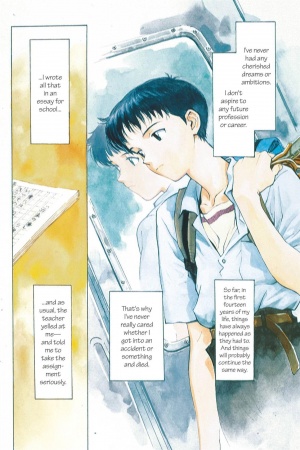
Plot changes
The plot of the manga follows the anime closely in its first half or so, with Sadamoto adding and changing significant elements in the second half. Most of the Action Arc is removed, as well as several Angels. The manga also features much less introspective, psychological and philosophical scenes.
- The manga's first chapter includes a scene from the Neon Genesis Evangelion Proposal that ultimately did not make it into the TV series, namely introducing the concept of Evangelions (and Rei Ayanami as a character) by showing one engaging in battle with the Angel, but having said battle ending with the Eva having to retreat after being outmatched. The scene is also altered a bit from how the Proposal described it, most prominently in how the Proposal's version had Rei piloting Eva-00 in the battle, but the manga has her in Eva-01 instead.
- Shinji acts more like the typical shounen mecha protagonist, with a lot more sarcasm and backbone than he ever showed in the anime. He is a lot more juvenile and less introspective than in the series.
- Shinji's past is also explored more in-depth, including interactions with his mother.
- Rei is also very different from her anime counterpart, even more so than Shinji. She comes across as more "human" than in the anime, opening up more to people through her complicated interactions with Shinji. The manga also displays more of Rei's thoughts and feelings, and even points towards some sort of affection for Shinji, perhaps even beyond the affection of just friendship.
- Asuka is markedly more childish, and her "popular" façade is more pronounced. In particular, she puts on more of a show for the adults as a proper, responsible girl. She is more self-centered and is somewhat less aggressive towards Shinji but still teases him a lot, and he is still interested in her and Rei, just like the anime.
- Gendo is by and large made more openly villainous and antagonistic. He is markedly more verbally abusive towards Shinji, culminating in him telling his son that he resents him, as he see him as competitor for Yui's affection. Rather than wanting to use Instrumentality to fulfil his desperate wish to be reunited with Yui, like his anime counterpart, he is instead driven by megalomania and revenge, wanting to gain the power of a god so he can take his anger out on the world, which he blames for taking Yui from him. It is also heavily implied that he murdered Kaji in this version of the story, rather than a henchman sent by Seele or Nerv.
- Pen Pen is given a backstory; he was a penguin that was being experimented on, and was rescued by Misato.
- Shinji runs away because he finds a journal Misato had been keeping, which detailed Shinji's behavior while she was watching him.
- Shinji, along with Toji and Kensuke, are not present for the fight with Gaghiel; Shinji watches it on tape at NERV HQ, and Asuka defeats the Angel by herself.
- As such, the circumstances of their meeting are changed: Shinji meets Asuka at an arcade, where he, Toji, and Kensuke watch her beat up some men.
- Toji is far more antagonistic and abusive towards Asuka, referring to her as a "bitch" several times. His Kansai dialect and "country manners" are also expanded upon.
- Kensuke is smitten with Asuka, however, he never mentions it to her, and Asuka remains apathetic towards him.
- Hikari approaches Shinji to ask for help in regards to Toji
- Shinji is also aware of Toji's status as the pilot of Eva-03 before the battle, as Toji made sure to tell him.
- Toji dies in the battle, as opposed to surviving with a missing leg.
- Thirteen of the Seventeen Angels are used, with the Lilin being the final Angel encountered, much like EoE.
- Sandalphon, Matarael, Ireul, and Leliel are entirely absent.
- Sahaquiel is present, but is not included in the numbering scheme used in the manga from that point onwards.
- Kaji is much more present in the manga than in the anime, giving Shinji a lot more advice, and being there for Shinji on multiple occasions, including just before the battle with Zeruel. It is also made very clear that he is dead in the manga with him embracing his dead brother's spirit, as opposed to the anime's more ambiguous scene depicting his death.
- Kaworu appears much earlier than in the anime, as a replacement pilot for Eva-02, when it appears that Asuka's synch ratio is dropping too low. This pushes Asuka to fight Arael in order to show she can still fight. He is much more alien and aloof than in the series, and Shinji constantly tries to avoid him.
- Kaworu is also present for the fight with Armisael, after becoming Eva-02's pilot.
- Like in the anime, in the manga Shinji shows no sexual attraction to Rei. But he is able to define their relationship when he says "What I feel for Ayanami, it doesn't go with words...like 'like' and 'want to go out with.' It's as if she's a part of me that was torn away a long time ago." (Volume 5 of the manga)
- After Kaworu's death, Shinji openly acknowledges his need for human interaction and the bonds that come along with it, and exhibits his despondency when those bonds are severed. For example, when Shinji heads to see Asuka in the hospital he says, "The Asuka I want to protect isn't this empty shell!" Meaning, Asuka's distance from him represents the completion of his social estrangement, not that he had sexual feelings for her, which is a clear contrast to his masturbating over Asuka's body in End of Evangelion. Asuka then wakes up from her coma and attempts to strangle Shinji before she is subdued (where she proclaims her hate for everyone). After this, the manga begins to loosely follow End of Evangelion.
- However in a change from EoE, Asuka is not brutally dismembered as she was, with Shinji arriving just in time to protect her and fulfill his promise to Misato.
- Unlike End of Evangelion, Shinji is rescued from the JSSDF by Gendo; Misato only shows up later to escort Shinji.
- The ending is drastically different, with the beach scene of Shinji and Asuka from EoE replaced with what appears to be a world where the Evangelions only existed long ago, with petrified Mass Production Evas treated as "relics", possibly eons after the events in the manga, or another reality entirely.
- The overall ending is more less open-ended as well, with Shinji looking forward to the future.
- On relationships, Sadamoto likens Rei to a "motherly existence", Asuka to [Shinji's] "longing for the opposite sex"[20] and Kaworu as that af high school student causing an impression on a younger, middle-school one, "not romance"[21], though Shinji ultimately rejects him.[22]
Changes in character backstory
- Shinji Ikari - Instead of living with his sensei for the years after Yui's death, Shinji lived with his aunt and uncle. From Stage 90, it is made clear that his relatives are Yui's relatives, but it is left unknown from dialogue whether his aunt or uncle are the sibling of Yui.
- Asuka Langley Soryu - Asuka was a test-tube baby, instead of being the child of Kyoko and Langley. Kyoko remains her mother, however, and the rest of her story remains similar.
- Ryoji Kaji - Kaji is given a backstory in the manga. He lived with many children on the streets, stealing food to survive after Second Impact.
Character design alterations
- Shinji Ikari - In the anime series, Shinji is always depicted with dark brown hair and dark blue eyes. However, in the manga, Shinji has black hair and brown eyes.
- Asuka Langley Soryu - In the anime, Asuka has dark red hair. In the manga, she has strawberry blonde hair.
- Kaworu Nagisa - Kaworu's hair and face became thinner and more angular, more mature in a way. His hair is shorter and silver-colored, as opposed to a lavender gray. His pupils are more prominently depicted than they are in the anime.
- Toji Suzuhara - In the anime, Toji was depicted with black hair. In the manga, he has light brown hair.
- Shigeru Aoba - His hairstyle is slightly different.
Supplemental material
- In the Japanese volumes of the manga there is usually an interview with one of the production team who made, or were otherwise involved in, the television series.
- At the end of each volume a 4-koma called Angel Kiss was usually present.
- This supplemental material was translated and published by Viz Media in their special edition release of Sadamoto's manga.
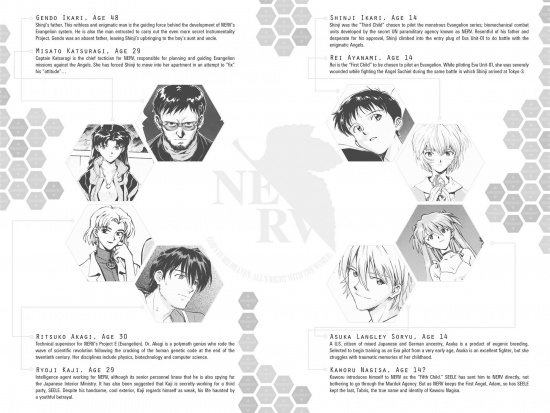
| Manga Artwork | ||
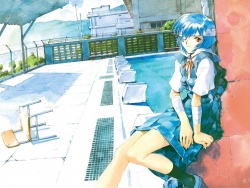 |
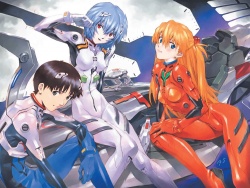 |
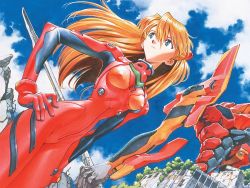 |
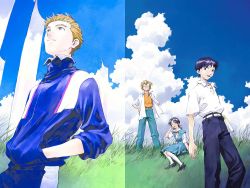 |
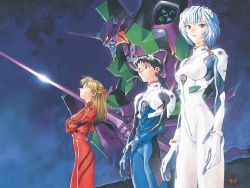 |
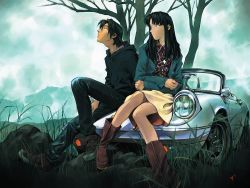 |
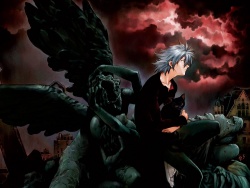 |
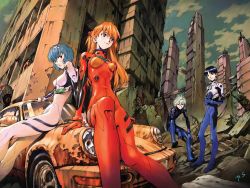 |
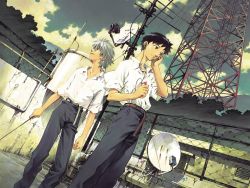 |
|
All artwork by Yoshiyuki Sadamoto | ||
Publishing history
The manga ran from December 26 of 1994 to June 4 of 2013. The reason for this is that while ostensibly publishing one "stage" a month in Shōnen Ace, Sadamoto's actual publication schedule was irregular: for example, between the publication in Japan of volume 4 and volume 5, two years elapsed.[23] (Volume 5 consisted of stages 27–29, published in January, March, and May 1998, with a year-long hiatus,[24] then stages 30–33 were published between July/October 1999.) This would only get worse in the 2000s, with multiple years-long hiatuses. In 2016, Sadamoto said he just wanted to finish his involvement in the franchise.[25] Apparently, Sadamoto's authorship of the manga caused problems for Gainax as multiple publishers felt "that he was too passé to be bankable".[26]
Notes
- Mari shows up in the bonus chapter of the final volume as a college schoolmate of Yui and Kyoko, who is smitten with Yui, and jealous that she is in a relationship with Gendo.
- ↑ http://www.animenewsnetwork.com/news/2013-06-07/young-ace-to-reprint-last-evangelion-manga-chapter-after-issue-sells-out
- ↑ The Essential Evangelion Chronicle: Side B
- ↑ " A: I think that the theme of the animated version is that the main character's attitude changes little by little. I think that in the anime, Anno wrote the script in his own words, and that is why the change occurs. And the reason for the subtle changes between the animation and the manga is that Yoshiyuki Sadamoto is writing the script using Anno's characters. I think the anime is...I can't say cuter. But it has the feel of an honors student. The manga is a little more twisted...the feeling of a flunk-out. I think the reason behind this is that Anno was his class president in elementary and junior high schools, and flunking out was something he couldn't do, whereas I never had that problem. (laughs)"
Q: You're saying that twisted sensibilities are a subtle difference?
A: According to Anno's thought process, a twisted person is one who puts on a cool face, but once you see his inside, you get to the crazy portion, just like all the young people today. My approach is the opposite. On the inside the characters are stoic and earnest, but the outside is twisted, just like a child. So I could never write the anime scripts in my own voice. My Shinji is quite a bit different than that. In the end it is his resistance, his refusal to listen to what Misato has to say, but he still makes the right decision. I think that approach is where our methods differ the most.
[...] "Q: Concentrating on the story, where do you think the biggest difference is between the manga and the anime?
A: Well I did write the script of the manga using the anime as a base. [...] And that's the reason I tend to change the script entirely. I pick and choose what is easiesr to say in manga, The anime became a craze among the fans, and I wanted to lower the demographic to people about 14 or 15 years old, but the content was so difficult, it just wouldn't dumb down." - Sadamoto's "My Thoughts at the Moment", 1996 - ↑ "Thank you. But that being said, you can’t use the manga to complement the Anime. This manga is just what I draw when I thought “it is should be like this, right?” Nothing more, nothing less."
"No, unlike Anno, I don’t have a life worth telling.(laugh) Perhaps I won’t express myself overall……But I can’t just copy Anno’s work. In this condition, I have to come up the theme myself, try to use different methods to describe. Every version of EVA has a different ending, I think the manga will have a different ending, too. As a work, entertainment is more important, so I can’t make the work same as the anime. But if I make the manga something completely different, then it can’t be called EVA. So not too close, not too far away. Rebuild is in the same position." - All About Kaworu Nagisa interview with Sadamoto - ↑ The publication of the Evangelion manga anticipated the airing of the anime by a year. Had you already planned what story the series would tell and to what extent?[The translator admitted to having trouble with this question.] We actually didn't think when we started, how it would develop, let's say things kind of expanded on their own. The anime ended and I continued doing the manga instead. There was no planning in the beginning. - Milano Manga Festival 2013
- ↑ Milan Manga Festival (2013)
- ↑ "As for the Evangelion manga, Sadamoto claims to have made it entirely by himself, without consulting with anyone, so any differences with the anime were all decided solely by him; this is in contrast to the anime where all decisions were made as a group, all sitting in the same room and arguing." "Sadamoto replied in the negative, as his only work as a mangaka is nothing more than a reworking of a pre-existing work." Milano Manga Festival: Reportage dei Sadamoto Days
- ↑ "First off, for the original [aired in 1995] animated series of Evangelion, we, including the Director [Hideaki Anno], all didn’t know a whole lot about Christianity but it seemed interesting so we went ahead and started the project. While the anime was airing, we started to learn more and started to add more ideas from Christianity. For example, the appearance of Lilith and even adding some new content at the last episode of the series. We just kept on applying new ideas that we learned while the show went on, although it's pretty ironic to talk about it now.Regarding my manga, I really wanted to separate it from the anime. So I decided to not research it at all. Some of the ideas may have came from Shinto... hmm now that I think about it, there aren't many reincarnations involved in Shinto. Well, it could be the Eastern way of thinking, the thought of where does the soul goes. So I didn't do any research about religion for the manga." - Yoshiyuki Sadamoto Interview @ JX USA 2013
- ↑ Interview with Sadamoto, includes his confirmation that the Mari bonus chapter was just fanservice Next question is about Evangelion Rebuilds, do you know about the symbol of the last movie (repeat sign in music)?:
Sadamoto: Just to start, I’d like to clarify my position on the Rebuilds. I’ve only done the main character designs so… (laugh)
Ah I see. It’s this (shows the symbol of Rebuild 3.0+1.0). We weren’t even able to read the title.
Sadamoto: (looks) Right, I’m sorry but it’s the first time I see it, to tell you how little my implication is.
[...]A question about the Evangelion manga, were you completely free on the script or were you consulting director Anno?
Sadamoto: There isn’t any script. When you make anime there are the storyboards, right? We were just sharing them, so I’m on the same level as a fan. I just wrote it on my own, looking at the storyboards. So I didn’t consult anyone, and of course no one from the TV series’ staff intervened in my manga.
So, in the last page of the manga there is Mari, one of the Rebuild’s characters…
Sadamoto: Oh, that’s not in the storyline, it’s just an extra chapter for the manga volume. It’s even apart from the movies, like fanservice. Just something you mustn’t think too hard about. (laugh) It’s just something that went through my mind, I thought it would be funny if it were like that.
I see. So it was not a request?
Sadamoto: It wasn’t and… since she appeared in Jo, Ha and Q, I wondered what her role in the story would be, and when I asked the staff, they told me that it won’t be possible to really go further in one film, so they had to tie the main story up, and that Mari may have almost no screen time. So I wondered what the point was, and decided to add a little bit of her story in the manga, on impulse. So it’s really not something the staff of the movies thought about or asked me to do, just something you can consider as a play of mine.
I see, since you know, fans tend to read deep into that kind of thing.
Yamaga: Yeah, particularly on Evangelion. They think every little detail has a meaning. (laugh)
Sadamoto: Well, but of course when we see Mari in Jo or Ha and see her call Gendo Gendo-kun or smell Shinji’s odor, she’s doing many strange things. Besides she seems to like songs of the Showa era very much since she’s singing them. [...] But again, it’s only me imagining all this. (laugh)
Has director Anno decided about that?
Sadamoto: Like I said, director Anno hasn’t approved or refuted that idea, he has nothing to do with what I just said. - ↑ Young Ace: The current Evangelion manga series has really begun to take a departure from the original television series. Can you tell us anything about the direction the manga will head in?Sadamoto: The original Evangelion film, End of Evangelion really expressed (creator) Hideaki Anno's psychological landscape at the time. I'm taking Anno's story as a basis, and filtering it through the lens of my own interpretation. I've always considered Evangelion to be, at its heart, the story of the relationship between a father and his son. I've been pursuing this angle from the outset of the manga series, and I'd like to pursue it to the end.YA: How are you involved in the recent film updates of Evangelion?S: The new films were originally intended to be a sort of "digest" of the original television series, but as you can see particularly with You Can (Not) Advance, they've begun to take a direction of their own. The theme will be that of isolation, if I'm not mistaken, and I don't believe that the story will be connected to my manga adaptation. That said, I'd like it if fans appreciated the new films and my manga version as separate stories. - Sadamoto Interview (Young Ace n.3, 2009)
- ↑ PR.- What was it like to make the adaptation of Evangelion to Manga? Did you have complete freedom or did you follow some kind of guidelines?YS.- I was told to work the way I wanted (laughs).PR.- Talking about the Evangelion Manga, since the release of Rebuild of Evangelion there has been a lot of speculation about the nature of the story thinking some fans of a story that repeats like a loop, that is, at the end of the Manga we see Shinji living as an ordinary guy, is it an interpretation of you or is it the official idea?YS.- My idea is that absolutely all aspects of the series create Evangelion and regarding what you ask, in the first chapter of the Manga we see that Shinji says something that he repeats exactly in the last chapter but with another intention. My idea was to show that Shinji in a short period of time has grown up and is being an adult. That was my idea.[...] PR.- Is that appearance part of the character's development in the movies?YS.- Ah! What I just answered is not official, it was my point of view (laughs) The truth is that the love story of Mari and Yui came up while chatting with the scriptwriter of Evangelion as something that could be interesting and curious but we should not give it much more importance (laughs). - Yoshiyuki Sadamoto Interview (AlfaBetaJuega 2017/07)
- ↑ On the one hand we wanted to create a different character, one that would appeal to a new type of audience and mark a break in the story. There were both "market" and plot requirements, and I had to keep them in mind. In the movies there is a great mystery around her presence, which is why you only find her there. I couldn't use her in the manga, although I would have liked to. She'll be up to a lot of mischief, together with Asuka, so wait for the new movie, because there will be surprises and a lot of interesting characters. Sadamoto Days – i fan meet e l’intervista (2013)
- ↑ - Young Ace, Vol. 1, pg. 2
- ↑ "In that time new things with story have happened and Sankei Shimbun has interesting new information on the project already. First off they mention the original 3 Eva films made 4.5 billion Yen in total at the Japanese box office. The manga published by Kadokawa Shoten has exceeded 15 million copies sold over the existing 10 volumes." from "9-9-06 (8:55AM EDT)---- Further Evangelion Shin Gekijou Ban Details" [1] [2] by the Anime News Service.
- ↑ 15.0 15.1 15.2 http://www.animenewsnetwork.com/news/2010-04-07/japanese-comic-ranking-march-29-april-4
- ↑ "Sadamoto designed characters for the legendary anime but was more involved in drawing the manga adaptation of Evangelion, which began its print run in Gekkan Shōnen Esu, a monthly magazine for boys, in February 1995--before the anime series was launched on TV. As of 2008, the anime series has already receded more than a decade into the past, and two movie versions have come and gone, but the manga series has not ended yet. It still continues, though irregularly, in the same magazine. So far, the manga episodes have been compiled into 11 volumes in Japanese, while San Francisco-based Viz Media has translated 10 of them into English. In Japan, the book form has sold more than 17 million copies in total." from The Daily Yomiuri (Tokyo) March 7, 2008 Friday. "Grim, complex 'Evangelion' easier to digest in print form"; by Shigefumi Takasuka, Daily Yomiuri Staff Writer, Yomiuri; Pg. 13
- ↑ Japanese Comic Ranking, June 26–July 16; AnimeNewsNetwork.com.
- ↑ "...the EVANGELION manga was the 1996 winner of Japanese manga-focus magazine COMICKERS' fan poll for best manga." http://web.archive.org/web/19980613050234/http://www.viz.com/eva/eva.shtml
- ↑ https://www.eva-info.jp/18080
- ↑ Sadamoto, Newtype December 1997
- ↑ - All About Kaworu Nagisa interview
- ↑ Milano Festival Days 2014
- ↑ "You've been anxiously waiting for two years! Vol. 5 is finally here! First, I'd like to give a heartfelt "thank you" to those of you who bought this book and are reading it now. I know you kind souls won't ask any questions about why it is so late, and will wait just as patiently for Vol. 6. Yes... I know you'll wait. I think you'll wait. Probably." (Emphasis in the original. Author's note in Viz's volume 5, ISBN 1-59116-403-6).
- ↑ http://www.ex.org/news/1999_05.html
- ↑ After all these years working on , how do you feel about the series?'
As an anime industry worker, for me has been just another job, and I need to get work apart from to keep going. It's a I don't really want to work on anymore at this point – but it's an important in Japan and there are many fans, so I take it seriously. He has not returned to work in the final Rebuild movie. - Interview: Legendary Evangelion Illustrator Yoshiyuki Sadamoto, ANN - ↑ pg 167 of Takeda 2002.
